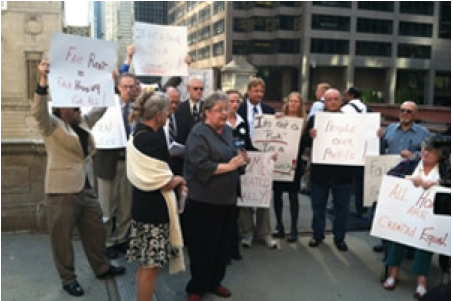Critics of Sam Zell’s mobile home park business tried a new tactic in their campaign against the company at its annual meeting yesterday. It didn’t work.
Durham, N.C.-based Reinvestment Partners, an advocacy group and shareholder in Equity LifeStyle Properties Inc., pushed a proposal at the meeting designed to shed light on the company’s political activities, including efforts to strike down rent-control ordinances on the West Coast.
But shareholders voted to reject the proposal, which called for the Chicago-based real estate investment trust to publish an annual report that would detail “direct, indirect and grassroots political contributions,” such as a $50,000 donation made in 2008 to support California Proposition 98, which sought to phase out rent control in the state.
The proposal is part of a broader push among advocacy groups to force public companies to disclose more about their political activities. So far in 2013, shareholder activists have filed 126 proposals about corporate political activity, according to a recent report from the Sustainable Investments Institute, a Boonsboro, Md.-based non-profit. While that number is the same as all of 2012, it’s notably higher than 105 proposals in 2011 and 67 in 2010, the report said.
Equity LifeStyle, whose chairman is Mr. Zell, is the nation’s largest owner of mobile home parks, with stakes in 383 properties across the U.S. and Canada as of the end of 2012. The company has come under fire from a small but vocal group of residents who accuse it of gouging its tenants on rent. While the REIT’s residents typically own their homes, they rent the land on which they sit from the company.
Adam Rust, director of research at Reinvestment Partners, acknowledged the Equity LifeStyle proposal was unlikely to pass, but said it allowed his organization to make a statement on behalf of residents at the company’s parks.
“For the people who live in the parks, I think to them, it seems like the company is making an effort to spend money on (political issues) when they’re not making an effort to spend money on other things,” such as maintenance at Equity LifeStyle communities, he said. “If the parks go down in quality, then you get a different kind of resident, you get new problems.”
Equity LifeStyle representatives did not return calls. In its proxy statement, the company recommended that shareholders vote against the proposal, calling it “duplicative and unnecessary” and saying it “represents the interests of a small minority.”
A FEW FIRSTS
Yesterday’s meeting, which was not open to reporters, marked the first time community advocates were able to get such a proposal before Equity LifeStyle shareholders, demonstrators said.
It also marked the first time that Equity LifeStyle directors held a brief Q&A period with the shareholder activists, including several residents of the company’s communities.
“We’re not overly optimistic, but we’re pleased with positive steps it looks like they’re trying to take,” said Pam Bournival, an Equity LifeStyle resident from Sarasota, Fla. She is also secretary of the National Manufactured Home Owners Association, which organized a demonstration outside the company’s headquarters with Washington-based Center for Community Change.
About 20 people from across the country attended the demonstration outside company headquarters at 2 N. Riverside Plaza, demanding better upkeep at Equity LifeStyle communities and lower rents.
Among them was Carla Burr, a retired real estate agent who lives in an Equity LifeStyle property in Chantilly, Va. Ms. Burr, 59, purchased her 1,800-square-foot home for $113,000 in 2006, when her lot rent was $740. Since then, it’s increased more than 25 percent to $945, about half of her monthly Social Security payment.
“I stand to lose everything, and the fact that I can’t get them to do anything to fix the community is just really hard,” she said, adding that older residents have injured themselves on the property’s poorly maintained sidewalks. “They’re making demands to fix certain things on our house . . . but you ask them to fix the roads and they go, ‘It’s not in the budget.’ “
Ms. Burr added that even if homeowners are able to find a buyer for their homes — a tough sell with higher rents — Equity LifeStyle has been reluctant to sign off on the deals, forcing some to turn over their titles and walk away.
The company has also sparred with rent-control advocates in court. An Equity LifeStyle mobile home park in San Rafael, Calif., was at the center of a lawsuit the company filed against the city in 2000 over San Rafael’s rent-control ordinance. Equity LifeStyle suffered a blow last month when the Ninth Circuit Court of Appeals ruled that the ordinance was constitutional, overturning a lower court decision from 2009, records show.
“I think the court understood it when they said that you shouldn’t buy rent-controlled communities and then turn around and complain about rent control,” said Keith Meloney, president of the San Rafael park’s homeowners association.
Equity LifeStyle shares were trading at $83.16 this afternoon after closing at an all-time high of $83.98 on Tuesday. Including dividends, the shares have returned 22.6 percent over the past year, vs. a 23.6 percent return for the Bloomberg REIT Manufactured Homes Index.
